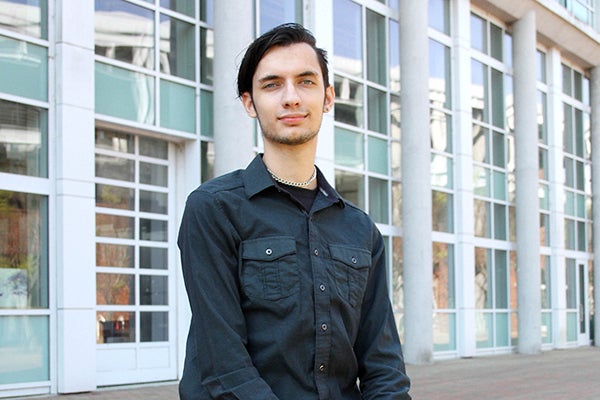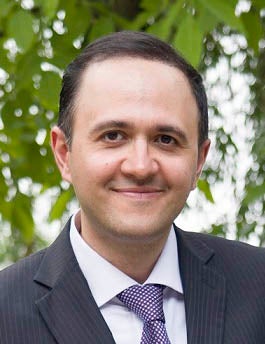ECU engineering student receives NSF research fellowship

East Carolina engineering student Shea Middleton received a graduate research fellowship from the National Science Foundation. (Photo by Ken Buday)
East Carolina University engineering student Shea Middleton has been awarded a National Science Foundation Graduate Research Fellowship.
The oldest graduate fellowship of its kind, the NSF GRFP provides a three-year annual stipend of $34,000 to the student as well as a $12,000 allowance for tuition and fees. Middleton, whose concentration is in biomedical engineering, is the first recipient of the fellowship in the Department of Engineering.
“I was surprised mostly, but I was very happy because I feel like this sort of thing can set me up for life because it is a really big honor,” Middleton said of receiving the fellowship. “I felt very appreciated, and I just want to make sure that I do enough to feel like I am worthy of it.”
Middleton is working on research with Dr. Ali Vahdati, assistant professor in the Department of Engineering, and postdoctoral researcher Anup Pant to improve knowledge of lung mechanics. The group is using imaging data from COVID-19 patients to create detailed computer models of infected lungs in an effort to better understand how the lung works in a diseased state.
“You can only see so much of the lungs, so the challenge is mathematically simulating the rest of the lungs to see how the behavior changes with COVID and normal lungs,” Middleton said. “We hope to be able to use it to improve ventilation because that generally does not have a good survival rate and to improve the outcomes of COVID and other pulmonary diseases that affect the lungs.”
Middleton, who is from Hope Mills near Fayetteville, is an ECU Honors College student and part of the Residential Scholars program. He is also a member of the Tau Beta Pi engineering society. Middleton said he’s always been interested in engineering and believes biomedical engineering gives him a chance to help people.
“I think it’s a good mix of analytical thinking and pure science, and I really enjoy being a problem-solver,” he said. “I think it’s really important to be hands-on and be on the cutting edge of innovation. That’s why I chose my concentration. It’s a great way to be involved in the medical field without necessarily having to be a frontline worker, but I can still have an important impact.”
Middleton said his fellowship application required three letters of support, two essays and a research plan.

Dr. Ali Vahdati (Contributed photo)
“Shea is a hard-working student who is always eager to learn more about simulation and modeling in biomedical engineering, and does not shy away from challenging projects,” Vahdati said.
Vahdati said Middleton’s selection for the fellowship is positive for the university.
“Receiving this fellowship by our student Shea shows that the Department of Engineering faculty provide excellent research opportunities and mentorship for our students that enables them to compete on the national stage for competitive fellowships and job opportunities,” he said.
Middleton said he has received plenty of support from those in the department and believes the fellowship will allow him to make connections to those in the field and in academia. In the end, though, he said his whole goal is to live up to the honor he has received in the fellowship.
“It’s pretty much delivering the results,” he said. “I want to make sure my work has a broader impact and delivers good results.”
After obtaining his master’s in biomedical engineering, Middleton said he would like to pursue a doctorate and then move into research.
“At some point in the future it would be nice to work with the disabled in an engineering context,” he said.
Middleton has a speech disorder and believes his success can inspire others.
“Being a speech disabled person who received such a prestigious fellowship is very important to me because you don’t often see disabled people in such prestigious positions,” he said. “It really makes me feel validated and that I am capable of doing as much and more than my peers.”